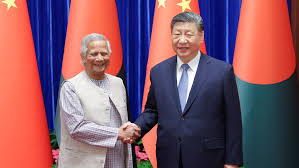Bangladesh hails China as ‘great friend’

The China-Bangladesh relationship has reached a peak after five decades of development, and Bangladesh looks forward to bringing bilateral ties to new heights in the next half-century, said the chief adviser of the South Asian nation’s interim government.
Muhammad Yunus made the remarks in an exclusive interview with China Daily on Saturday before wrapping up his first visit to China since assuming his current post in August.
Yunus, a Nobel Peace Prize laureate and globally renowned social-business entrepreneur, said that China’s neighborhood diplomacy resonates deeply with him, as do a series of major China-proposed global initiatives, such as the Belt and Road Initiative and the building of a community with a shared future for mankind.
As this year marks the 50th anniversary of the China-Bangladesh relationship, Yunus said the two neighboring countries have set an example of state-to-state relations and people-to-people exchanges that the rest of the world could follow.
Yunus also said the bond of the China-Bangladesh relationship is strong enough for a long and successful journey, because the two nations make it a point to “be frank with each other, be friendly to each other, share things with each other, help each other”.
“Having such a great friend together with us makes us feel good, makes us feel strong. It’s a very inspiring relationship for us,” he said, adding that his visit to China will help the work back in Bangladesh, as the country is now at a historic juncture.
In recent years, the economic and trade cooperation between China and Bangladesh has achieved a high level of development. China has been Bangladesh’s largest trading partner for 15 consecutive years, with bilateral trade exceeding $23.9 billion in 2023.
Bangladesh was the first country in South Asia to join the BRI. The implementation of a series of Belt and Road projects, especially in infrastructure construction, has injected impetus into Bangladesh’s economic growth and improved the livelihood of its people.
Yunus said the BRI, which was proposed by President Xi Jinping in 2013, is very important for Bangladesh, which has vast access to the ocean, because it can connect the region’s landlocked nations together and jointly promote economic development.
The chief adviser said it is normal for “anything you do for the first time”, such as the BRI, to encounter doubts, but everyone will ultimately be comfortable with it as long as it meets the needs of the people.
According to Yunus, a special economic zone in Bangladesh has been established under the BRI for Chinese investors to set up their industries and sell their products more conveniently to the world.
“You benefit from access to our market and the global market. We benefit by having your production facilities in Bangladesh, by taking our young people to help build and work for those factories. That way, we can get the complementarity between the two countries,” he said.
Deep impression
During the chief adviser’s four-day stay in China, he held talks with Xi, who Yunus said is “an inspiring person” he has always admired.
The two had previously met in China in 2009.
Yunus said that Xi is a wise person who is looking for ideas and looking for things to do for his people.
Xi can see the real problems of the people on the ground, he said.
Yunus, a former banker, who pioneered the microcredit movement, which provides very small loans to millions of the world’s poorest people, said that Xi still remembered their first meeting.
“I was very impressed that someone at this position was thinking about something I do far away with the poor women in the village. So I always admire him for that,” Yunus said.
He also said he believes that the vision proposed by Xi of building a community with a shared future for mankind arises from the idea that “no matter where we are in the boat together, if this boat sinks, we are finished”.
It’s not about one country or another country, Yunus said, but rather “as a human being on this planet, we have to save this planet. That’s the No 1 goal”.
Yunus said he has been promoting something similar in the notion of creating a world of “three zeros — zero poverty, zero unemployment and zero net carbon emissions.
“It’s our collective responsibility to protect this (planet),” he said.





